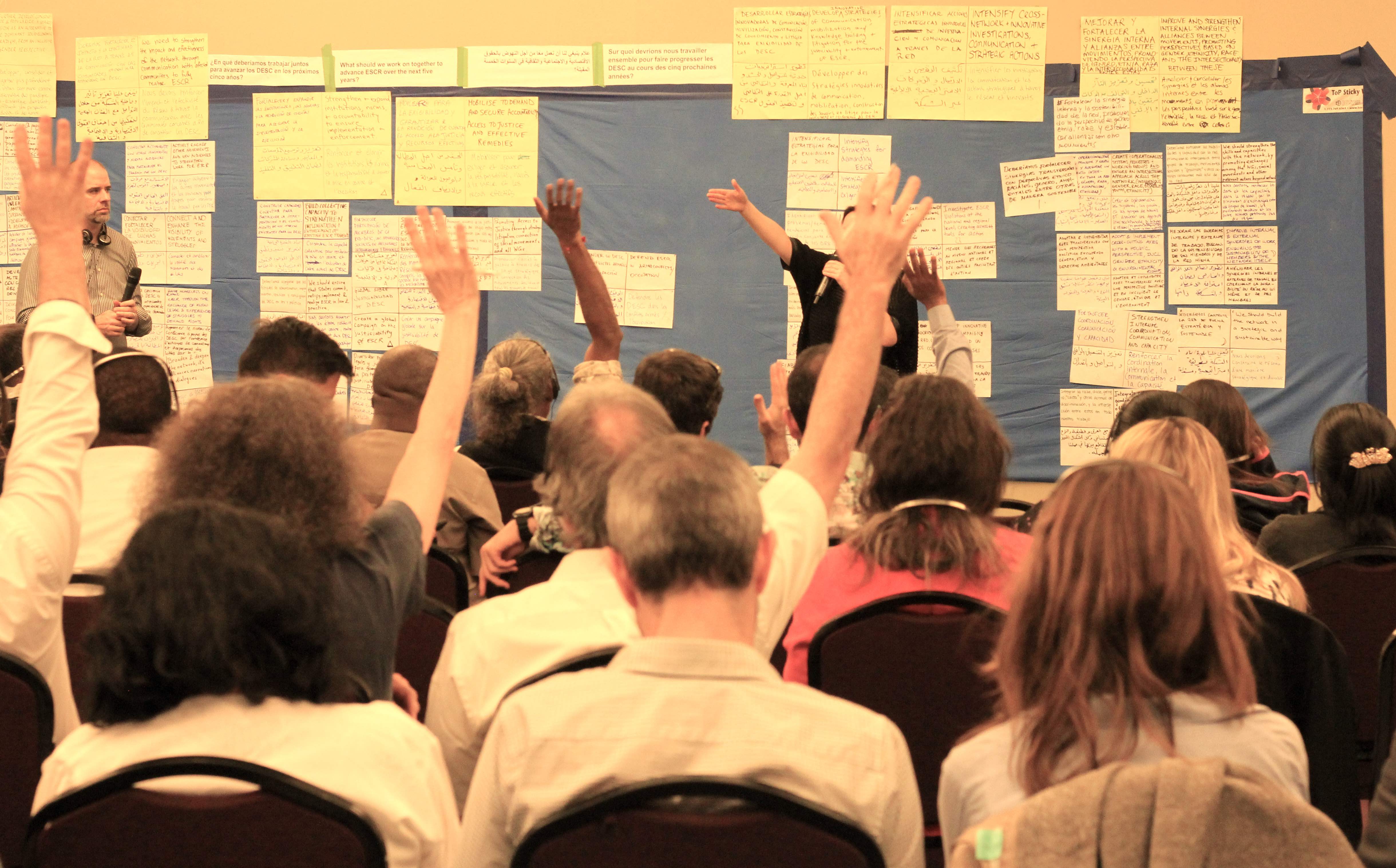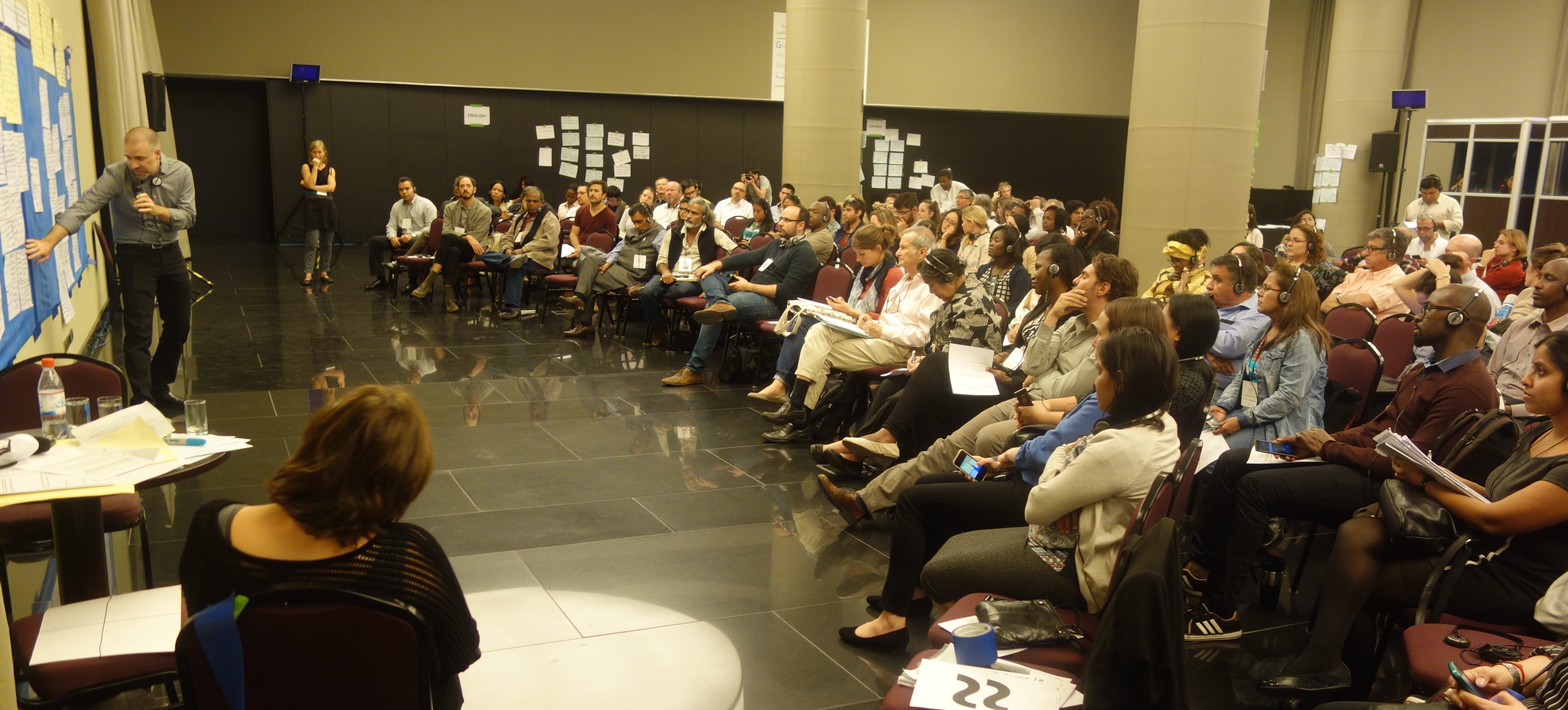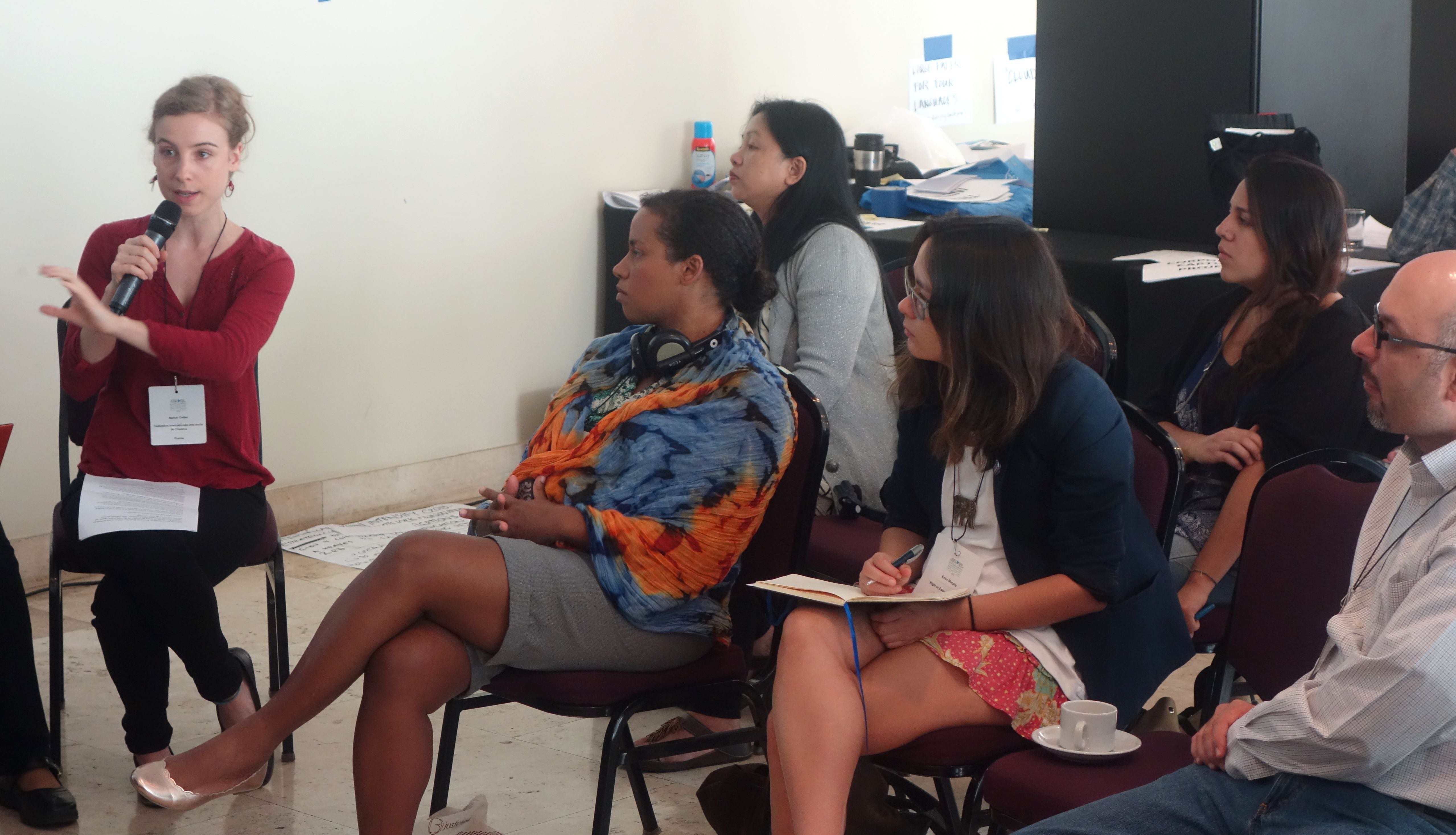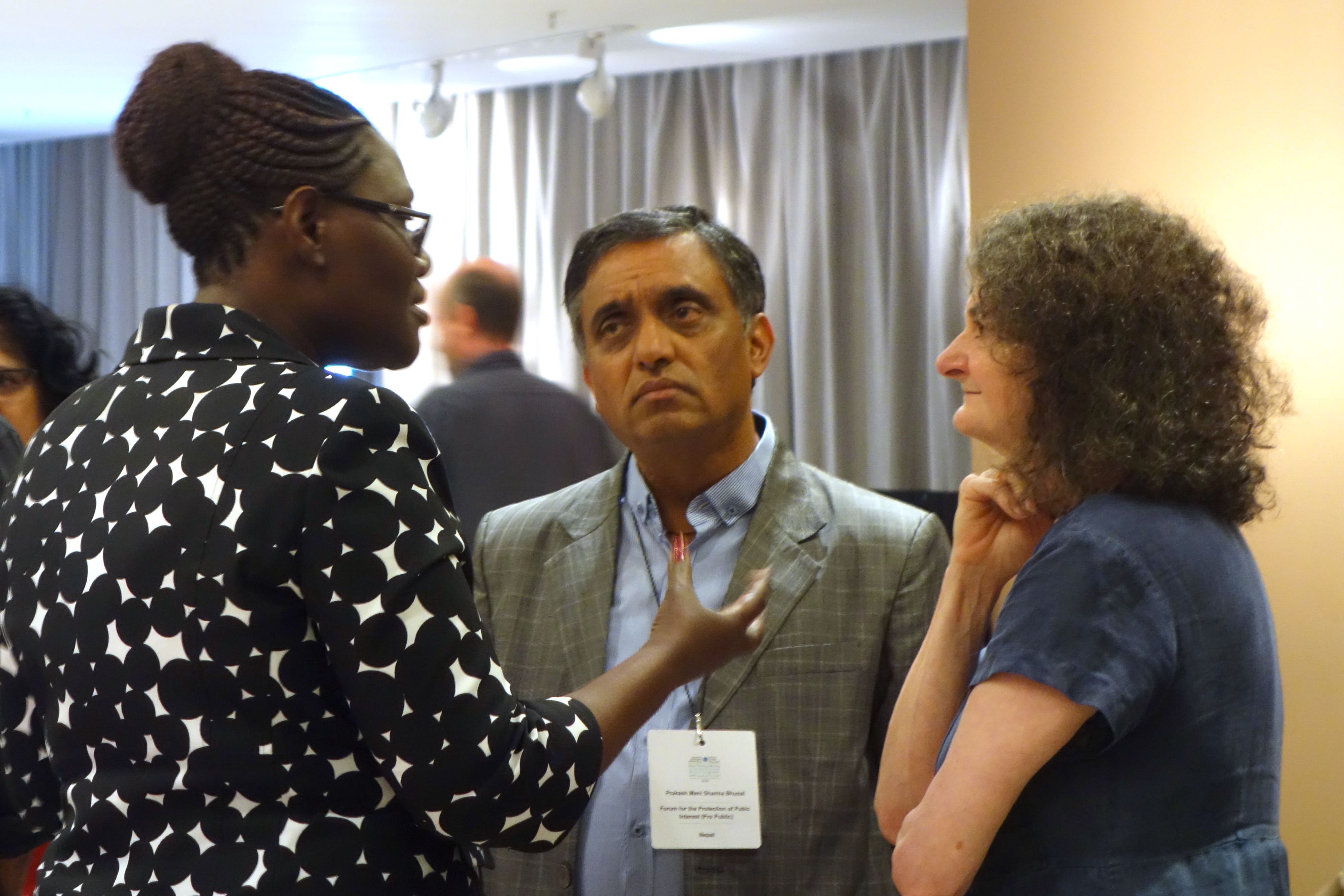The Network takes significant steps towards new strategic plan
The Global Strategy Meeting (GSM) offered an opportunity for members to develop shared objectives which will guide common action and greater collaboration across the Network, helping to realize the potential of ESCR-Net as a collective force for human rights and social justice.
In bringing together the GSM, the Board, International Planning Committee and secretariat were guided by the question: What transformative, collective action will ESCR-Net undertake to realize economic, social and cultural rights (ESCR) over the next five years, responsive to global conditions? While a series of interviews and small group discussions had informed the objectives of ESCR-Net’s last strategic plan (2013-2016), many members stressed the need to meet in person to assess the progress of the Network, deepen common analysis of evolving global conditions, and work to shape shared objectives.

On the third day of the GSM, over 140 representatives of member organizations worked across four languages to begin the process of setting shared objectives. Members were asked to focus on concrete actions that would contribute to transformative impact, by answering the question: What should we work on together to advance ESCR over the next five years? Through a facilitated process based on input from each member, initial responses were shared and discussed in five smaller groups (which were purposely bi-lingual, cross-working group, and cross-regional). Next, similar responses were grouped together by members in clusters, first within the five groups and then in a full plenary process. Each cluster was given an interim working title – responding to the workshop question – to reflect the main ideas or intention represented by the cards in the particular cluster.
This Network approach is built on deepening collaborative practice in working groups, via annual planning processes and related events like the Peoples’ Forum on Human Rights and Business. It also drew on the 18-month effort of the Social Movement Working Group to identify common global conditions impacting their diverse communities and articulate emerging points of unity between their struggles.
Towards shared objectives
Emerging from this collaborative process, ESCR-Net members present at the GSM proposed that collective action should be focused on/informed by:
- Alternative visions of social-political-economic frameworks and practices;
- Access to justice, effective remedies and implementation via strengthened institutions, standards and accountability;
- Linkages with, and across, social movements and affected communities, revealing and connecting peoples’ lived experiences;
- Security, protection, credibility and greater capacities for human rights defenders;
- Strategic connections, communications and actions by the Network, and with other movements and allies, regarding both specific and systemic ESCR issues; and
- An intersectional analysis.
Ultimately, these areas of focus will form the foundation for the Network’s agreed shared objectives, to be included in our forthcoming five-year strategic plan. Members will receive a full report on the GSM shortly, which will return all member responses from various exercises. Over the next few months, the Board, with the support of the secretariat, will work to develop a draft strategic plan – including related elements of institutional development – for review and approval by members. This strategic plan will draw foremost on collective work during the GSM, building on the Common Charter for Collective Struggle, inviting input of those who could not be present, and drawing on action planning and ongoing dialogue in working groups.

Towards Two-Year Working Group Action Plans
On the fourth day of the GSM, thematic working groups considered the focus of their collective work for the next two years, reflecting both on global conditions outlined in the Common Charter for Collective Struggle and on the emerging Network shared objectives.
Each working group considered existing and new key action areas, and related specific projects/activities to advance these areas. In doing so, members discussed the extent to which the proposed action area responds to a key global challenge or opportunity, and the extent to which ESCR-Net is able to play a unique and valuable role in addressing these through collective work. Members also began to take into account the intended impact(s), the choices to be made given available time and resources, and potential opportunities for collaboration with other working groups and/or for contributing to Network-wide actions.
Below are some of the initial priorities proposed by members present. Over the next several weeks, the secretariat will facilitate a process via online discussion and other communication with all members of each working groups to finalize two-year action plans.
Women and ESCR
Regarding priority substantive/thematic areas, three main action areas were identified: women’s rights and substantive equality in relation to (1) housing, land and natural resources; (2) sexual and reproductive health and rights; and (3) right to work. With respect to housing, land and natural resources, WG members expressed commitment to continued work, identifying sub-topics such as the impact of mega-projects on women’s rights, women’s access to housing rights in urban informal settlements and monitoring the new urban agenda and the Sustainable Development Goals (SDGs) at multiple levels. Concerning the right to work, members discussed projects including domestic work and gender-based violence in the workplace. On the topic of sexual and reproductive health and rights (SRHR), topics included violations affecting girls, SRHR education and access to safe and quality abortion services and contraception through activities such as joint lobbying of national governments and strategic litigation and advocacy. Focusing on these themes will allow a greater number of members to actively participate in the WG by contributing their expertise in relevant areas.
An additional action area was informed by a priority highlighted throughout the meeting to more fully infuse a gender and intersectional analysis and approach throughout ESCR-Net (which will in turn more broadly affect individuals and communities who are impacted by the work of the Network). Members articulated two aspects of this work: (1) collaboration with other WGs, for example on specific projects or activities and (2) integration of a feminist analysis across the Network. WG members emphasized that both a gender/feminist approach and an intersectional approach must be part of these efforts. Specific activities to deliver on this priority area include: create a common charter towards a feminist perspective for the WG and Network, conduct webinars on gender/intersectional issues and create a fact sheet on these issues.

With respect to strategy and methodology, WG members discussed further developing current strategies to advance substantive equality broadly and in relation to the new substantive themes identified as priorities. For example, they expressed continued commitment to strengthen capacity to defend and advocate women’s ESCR through workshops and webinars as well as development and dissemination of materials. Additionally, building on and nuancing an existing strategy, members discussed leveraging members to act together to advance international standards on women’s substantive equality on ESCR and support implementation. Members emphasized the importance of an increased and more explicit focus on the implementation of standards on women’s substantive equality as well as extending these implementation efforts to national level decisions on women’s substantive equality and ESCR. A second suggested element of this strategy is litigation, such as through amicus interventions or collaboration with the Strategic Litigation WG to support cases on women’s ESCR before UN treaty bodies.
Finally, WG members at the GSM expressed strong and unanimous support to form a Steering Committee. Relevant details (specific role of the Steering Committee, nomination process, number of members, rotation process, etc.) will be discussed with the entire WG.
Strategic Litigation
In order to respond to the diversity of violations undermining the ESCR of communities and individuals and to advance progressive jurisprudence and processes relevant to multiple struggles, the Strategic Litigation Working Group (SLWG or Group) continued to prioritize a methodological approach to the protection and development of ESCR during its discussions at the GSM. In other words, the Group favored a more inclusive and plural consideration of claims, covering all ESCR, in conjunction with an ongoing use of the Group’s guidelines for the selection of cases. This approach could also give the SLWG flexibility to pursue cases with wider systemic implications addressing common global conditions faced by communities, as identified in the Common Charter for Collective Struggle. To support the Steering Committee and wider SLWG in considering collective interventions strategically (including anticipated impacts, remedial approaches, and wider advocacy strategies and implementation plans), cases will be circulated for discussion via the case selection table. In line with emerging Network-wide objectives and the Network’s core principles, the Group also discussed and reinforced the priority of greater connection with affected communities and grassroots groups in advancing work on cases and shaping advocacy for institutional development.
Two key action areas were proposed during the GSM: (1) support to strategic litigation primarily through intervention on cases, and (2) support to implementation primarily through institutional development. This work will likely involve ongoing focus on the UN Committee on ESCR and potentially other treaty bodies under both action areas. In relation to new projects, the Group discussed a few potential initiatives for further prioritization and possible development under action area (1), namely: use of amici curiae as a way of supporting ESCR cases at the regional level (the Group has so far focused on international and national levels), creation of expert panels for the adjudication of ESCR in cases where courts are not effective, creation of an access to justice initiative or campaign, creation of an interdisciplinary team to formulate claims and remedies and/or creation of a panel for scientific support to litigation. As an ongoing support to strategic litigation, the Group will continue adding cases to its multilingual caselaw database.
Under action area (2), the Group suggested the organization of trainings for judges and public attorneys on ESCR. The Group will also maintain a commitment to implementation of, and sharing lessons related to, the Endorois case (ACHPR, 2010), while giving priority to institutional strengthening as the main focus of this action area. While not limiting thematic priorities under the action areas, the Group expressed interest in potential litigation to support advocacy on corporate capture, fiscal policy and women’s ESCR, States’ extraterritorial obligations, and ESCR in conflict situations.
Corporate Accountability
Members reaffirmed the priority action areas that had emerged over the course of the past three Peoples’ Forums on Human Rights and Business, noting their close alignment with the Common Charter for Collective Struggle and emerging Network-wide objectives.
Several themes emerged from CAWG members concerning the future direction of the Corporate Capture Project, in light of explicit inclusion, in the Common Charter for Collective Struggle, of corporate capture as a common global condition affecting the enjoyment of ESCR globally. Suggested ideas included: increased support at national level for research and documentation (including developing resources members can use to identify and document corporate capture cases); developing and distributing materials to simplify and popularize the concept of corporate capture at local and national level, strong campaigning efforts to denounce corporate capture; various legal strategies (e.g. developing guidelines to preserve judicial independence).
Regarding the Treaty Initiative Project, members suggested a number of specific activities, including turning the Ten Key Proposals for the Treaty into simplified materials for mobilizing local and national support, as well as encouraging members involved in the Corporate Capture Project to bring their analysis and advocacy skills into efforts to support the treaty. The most widely supported idea was to intensify national activities via community education, public campaigning, lobbying of governments and facilitating popular mobilization efforts. These ideas were connected to the emerging Network-wide objective to ‘mobilize to demand strong institutions, norms, and accountability to ensure access to justice, effective remedies, and implementation.’ Similarly, CAWG prioritized ongoing engagement in the development of the forthcoming General Comment on business activities and economic, social and cultural rights by the UN Committee on ESCR. The General Comment provides an important and more immediate space to advance priorities for the text of the treaty, and could therefore be used as an authoritative advocacy tool in the treaty negotiations.

Members agreed again that Strategic Case Support is an integral part of our collective work, and echoes the emerging Network objective to ‘strengthen the credibility and capacity of defenders’. Members noted that documentation is important across all CAWG activities and, more specifically, discussed how to evolve the documentation tool already developed by members in partnership with the Business and Human Rights Resource Centre.
Members supported the need to strengthen an intersectional analysis in the working group. In order to begin this process more systematically, members agreed to extend an invitation to the Women and ESCR Working Group to provide critical input into the CAWG planning process for 2017 – 2018.
Monitoring
Leading up to the GSM it was recognized that most, if not all, projects in the Network involve monitoring in some capacity (whether at the stage of human rights impact assessment, monitoring and reporting on ongoing situations, use in litigation and other forms of advocacy to achieve redress or transformation, evaluation of trends and causal relationships, or otherwise). For that reason, Monitoring Working Group (MWG) members chose to spend the morning with various other working groups, to identify and explore possible connections with existing and proposed projects/activities across the Network.
During their afternoon discussions, the MWG members proposed the following key action areas, with associated specific projects/activities:
- Confront weaknesses and biases in human rights accountability mechanisms: Members focused primarily on the need to strengthen community-based monitoring, recognizing that ‘who’ undertakes the monitoring of ESCR is just as important as exactly ‘what’ is being monitored. In pursuing such an approach, members explicitly noted the need for meaningful connection with communities particularly affected by systemic and/or significant ESCR issues. Members also considered the possibility of developing ESCR-Net monitoring position papers on topical issues, as well as the need to ensure implementation of existing monitoring frameworks for ESCR.
- Ensure that States publish better quality, more disaggregated data: Members discussed the continuation of an existing MWG project that focuses on the gathering of recommendations made by UN treaty bodies about the collection and provision of disaggregated data by States. Following analysis of the collated information, members will consider appropriate advocacy action to take to encourage a progressive shift in treaty body practice, leading to corresponding advances in monitoring practices by States and other stakeholders.
- Strengthen working group/Network-wide actions through monitoring strategies: Members expressed strong enthusiasm for collaborating with other working groups and in Network-wide initiatives to strengthen existing and emerging projects through applied monitoring expertise and sharing of tools, resources and developments. While a number of ideas for specific projects/activities were proposed, the most popular included: the convening of online methodology workshops to propose and develop monitoring strategies for particular Network projects; and the capacity-building of Network members to undertake analysis necessary to confront systemic global challenges (for example, in relation to fiscal policy, monetary policy, progressive realization of ESCR, and inequality). Related to these proposals, members also suggested a mapping of the monitoring expertise of the MWG and the monitoring capacity building needs of Network members, as well as the continued strengthening of the MWG website resources, particularly as related to ongoing focus areas of the Network such as corporate accountability.
It is noted that the proposed areas of focus correlate in particular to the emerging shared objectives relating to communication with affected communities, the operationalizing of an intersectional approach across the Network, and the development of strong institutions and accountability practices.

Economic Policy
In line with the analysis and call to action of the Common Charter for Collective Struggle, members foremost prioritized deepening investigation and analysis of the global economic system via the human rights framework and informed by grassroots struggles, identifying and amplifying alternatives, in support of a campaign or collective action.In shaping and prioritizing this action area, members combined proposals that focused on a “global campaign including investigation, advocacy, and communication in order to reposition human rights as norms superior to economic agreements” or similarly a “campaign to attack what is behind all the issues represented in the Network – the current system of global capital,” which “should be guided by the interests and demands of persons and organizations directly affected by human rights violations” and “build not so much on existing NGOs/Networks but struggles [working to] lift them up, build support for them, and share their links to each other and the global economic system,” while “crowd-sourcing alternative economic policies and practices.” A few members expressed a reluctance to move too quickly to taking up specific issues, policies or institutions, emphasizing that these serve or are part of a wider economic model.
In beginning to articulate specific activities and intended impacts under this action area, several members advocated for building an analysis based on specific grassroots struggles of ESCR-Net Members, tracing threats of dispossession, impoverishment and related human rights violations to specific policies and institutions and ultimately to the wider economic system. While serving to connect these struggles and deepen a common analysis, this approach would ideally lead to identifying clear advocacy targets and coherent strategies for collective action. This would also likely involve popular communications efforts, connecting and amplifying grassroots struggles, articulating alternatives potentially in partnership with progressive economists and new alliances, and ultimately shifting the terms of debate or narrative towards the primacy of human rights.
Several members also expressed interest in collectively addressing the shrinking role of the State and civil society due to international financial institutions, including the International Monetary Fund. In beginning to consider specific activities/advocacy efforts related to this action area, members proposed undertaking a human rights assessment of international financial institution conditionality focused on austerity and tax policy and creating an IMF Watch to challenge harmful economic policies across the Network in times of deepening austerity. Multiple members also expressed their interest in each of the following potential action areas, including: promoting the role of public authorities in fulfilling ESCR and resisting privatization, reclaiming the concepts of public utility or general interest as central to human rights and alternative economic approaches, and taking action regarding the environmental impact of the neoliberal model, while a couple noted intersecting advocacy on extraterritorial obligations and corporate capture as possible entry points or spaces for cross-working group collaboration. A couple highlighted the Agenda 2030 context, which is framing discourses and work on inequality and poverty. Finally, some recalled the recent mapping of members and related webinars, which also foregrounded a systemic critique of the dominant economic model via the human rights framework and then pointed to specific manifestations of the global economy, including trade and investment, privatization and public-private partnerships, and infrastructure, energy and extractives, as well as the strong desire to amplify or articulate alternative models. As ESCR-Net looks to hire a program coordinator focused on economic policy to support collective work, members noted the need to continue this strategic dialogue.
Conclusion
The GSM was an important moment in the overall process to deepen common analysis, define shared objectives and articulate strategies that will guide collective action in the coming period. In recognition that further work is still required to refine and consolidate the common agreements and proposed areas of work identified in Argentina, ESCR-Net members, with the leadership of the Board and support of the secretariat, will work to bring these initial conclusions into working group action plans and a Network-wide, five-year strategic plan over the next few months.
